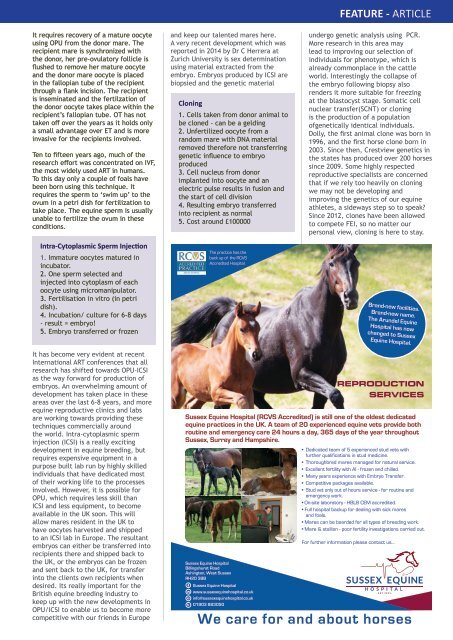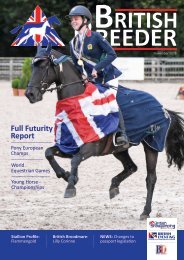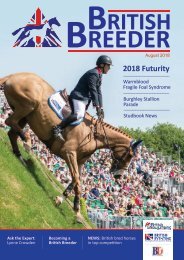You also want an ePaper? Increase the reach of your titles
YUMPU automatically turns print PDFs into web optimized ePapers that Google loves.
It requires recovery of a mature oocyte<br />
using OPU from the donor mare. The<br />
recipient mare is synchronized with<br />
the donor, her pre-ovulatory follicle is<br />
flushed to remove her mature oocyte<br />
and the donor mare oocyte is placed<br />
in the fallopian tube of the recipient<br />
through a flank incision. The recipient<br />
is inseminated and the fertilzation of<br />
the donor oocyte takes place within the<br />
recipient’s fallopian tube. OT has not<br />
taken off over the years as it holds only<br />
a small advantage over ET and is more<br />
invasive for the recipients involved.<br />
Ten to fifteen years ago, much of the<br />
research effort was concentrated on IVF,<br />
the most widely used ART in humans.<br />
To this day only a couple of foals have<br />
been born using this technique. It<br />
requires the sperm to ‘swim up’ to the<br />
ovum in a petri dish for fertilization to<br />
take place. The equine sperm is usually<br />
unable to fertilize the ovum in these<br />
conditions.<br />
Intra-Cytoplasmic Sperm Injection<br />
1. Immature oocytes matured in<br />
incubator.<br />
2. One sperm selected and<br />
injected into cytoplasm of each<br />
oocyte using micromanipulator.<br />
3. Fertilisation in vitro (in petri<br />
dish).<br />
4. Incubation/ culture for 6-8 days<br />
- result = embryo!<br />
5. Embryo transferred or frozen<br />
and keep our talented mares here.<br />
A very recent development which was<br />
reported in 2014 by Dr C Herrera at<br />
Zurich University is sex determination<br />
using material extracted from the<br />
embryo. Embryos produced by ICSI are<br />
biopsied and the genetic material<br />
Cloning<br />
1. Cells taken from donor animal to<br />
be cloned - can be a gelding<br />
2. Unfertilized oocyte from a<br />
random mare with DNA material<br />
removed therefore not transferring<br />
genetic influence to embryo<br />
produced<br />
3. Cell nucleus from donor<br />
implanted into oocyte and an<br />
electric pulse results in fusion and<br />
the start of cell division<br />
4. Resulting embryo transferred<br />
into recipient as normal<br />
5. Cost around £100000<br />
The practice has the<br />
back up of the RCVS<br />
Accredited Hospital.<br />
FEATURE - ARTICLE<br />
undergo genetic analysis using PCR.<br />
More research in this area may<br />
lead to improving our selection of<br />
individuals for phenotype, which is<br />
already commonplace in the cattle<br />
world. Interestingly the collapse of<br />
the embryo following biopsy also<br />
renders it more suitable for freezing<br />
at the blastocyst stage. Somatic cell<br />
nuclear transfer(SCNT) or cloning<br />
is the production of a population<br />
ofgenetically identical individuals.<br />
Dolly, the first animal clone was born in<br />
1996, and the first horse clone born in<br />
2003. Since then, Crestview genetics in<br />
the states has produced over 200 horses<br />
since 2009. Some highly respected<br />
reproductive specialists are concerned<br />
that if we rely too heavily on cloning<br />
we may not be developing and<br />
improving the genetics of our equine<br />
athletes, a sideways step so to speak?<br />
Since 2012, clones have been allowed<br />
to compete FEI, so no matter our<br />
personal view, cloning is here to stay.<br />
Brand-new facilities.<br />
Brand-new name.<br />
The Arundel Equine<br />
Hospital has now<br />
changed to Sussex<br />
Equine Hospital.<br />
It has become very evident at recent<br />
International ART conferences that all<br />
research has shifted towards OPU-ICSI<br />
as the way forward for production of<br />
embryos. An overwhelming amount of<br />
development has taken place in these<br />
areas over the last 6-8 years, and more<br />
equine reproductive clinics and labs<br />
are working towards providing these<br />
techniques commercially around<br />
the world. Intra-cytoplasmic sperm<br />
injection (ICSI) is a really exciting<br />
development in equine breeding, but<br />
requires expensive equipment in a<br />
purpose built lab run by highly skilled<br />
individuals that have dedicated most<br />
of their working life to the processes<br />
involved. However, it is possible for<br />
OPU, which requires less skill than<br />
ICSI and less equipment, to become<br />
available in the UK soon. This will<br />
allow mares resident in the UK to<br />
have oocytes harvested and shipped<br />
to an ICSI lab in Europe. The resultant<br />
embryos can either be transferred into<br />
recipients there and shipped back to<br />
the UK, or the embryos can be frozen<br />
and sent back to the UK, for transfer<br />
into the clients own recipients when<br />
desired. Its really important for the<br />
British equine breeding industry to<br />
keep up with the new developments in<br />
OPU/ICSI to enable us to become more<br />
competitive with our friends in Europe<br />
Sussex Equine Hospital<br />
Billingshurst Road<br />
Ashington, West Sussex<br />
RH20 3BB<br />
w<br />
e<br />
t<br />
Sussex Equine Hospital<br />
www.sussexequinehospital.co.uk<br />
info@sussexequinehospital.co.uk<br />
01903 883050<br />
REPRODUCTION<br />
Sussex Equine Hospital (RCVS Accredited) is still one of the oldest dedicated<br />
equine practices in the UK. A team of 20 experienced equine vets provide both<br />
routine and emergency care 24 hours a day, 365 days of the year throughout<br />
Sussex, Surrey and Hampshire.<br />
• Dedicated team of 5 experienced stud vets with<br />
further qualifications in stud medicine.<br />
• Thoroughbred mares managed for natural service.<br />
• Excellent fertility with AI - frozen and chilled.<br />
• Many years experience with Embryo Transfer.<br />
• Competitive packages available.<br />
• Stud vet only out of hours service - for routine and<br />
emergency work.<br />
• On-site laboratory - HBLB CEM accredited.<br />
• Full hospital backup for dealing with sick mares<br />
and foals.<br />
• Mares can be boarded for all types of breeding work.<br />
• Mare & stallion - poor fertility investigations carried out.<br />
For further information please contact us…<br />
SERVICES<br />
SUSSEX EQUINE<br />
H O S P I T A L<br />
- E S T 1 9 5 1 -<br />
We care for and about horses<br />
BRITISH BREEDER| 47





